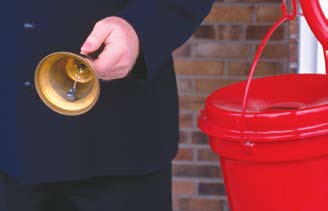The Gift of Receiving
By Stan Bumgarner M. Div., Counselor
When my twins were four years old, I decided they were mature enough to grasp Christmas was about more than just getting presents from Santa and family. So I took them to a local discount store with the idea of helping them shop for their mother, grandparents, teachers and other important people in their lives. This turned out to be a deeply flawed plan.
 To my disappointment, the “spirit of the season” evaded them. Rather than finding joy in shopping for others, they quickly went about the task of filling the shopping cart with things they wanted. My son offered up his well thought through, and well-worn, list of items he’d shared with Santa. My daughter, sans Santa list, started free lancing through the aisles like a contestant on a game show. What I imagined as a wonderful family teaching moment became a contest to see if I could I empty the cart faster than they were filling it with gifts for themselves.
To my disappointment, the “spirit of the season” evaded them. Rather than finding joy in shopping for others, they quickly went about the task of filling the shopping cart with things they wanted. My son offered up his well thought through, and well-worn, list of items he’d shared with Santa. My daughter, sans Santa list, started free lancing through the aisles like a contestant on a game show. What I imagined as a wonderful family teaching moment became a contest to see if I could I empty the cart faster than they were filling it with gifts for themselves.
I’m embarrassed to admit I lost my temper with them. Clearly they were selfish little heathens incapable of thinking of anyone but themselves. All semblance of “holiday cheer” evaporated like snow on a hot roof and I hissed, “Okay, that’s it. We’re done. This is not about you. It’s about other people.” I grabbed them both, wheeled, and walked away from the half-full cart. Tears filled their eyes as we hit the sidewalk outside. I felt awful for making them cry. Then, the sounds of a Salvation Army bell-ringer offered redemption.
I kneeled to their eye level. Offering a dollar to each I instructed them to put the money in the red kettle situated about twenty yards away. Off they raced and Dad (I thought) had once again saved the day. Surely they would understand putting money in the kettle for less fortunate families.
By the time I got there they had already put the dollars in the kettle and a boy I judged to be thirteen or fourteen was offering each of them a Christmas sucker in return. Not what I had in mind. This was not selfless giving. This was quid pro quo. Give money, get candy. They loved it. I stopped the transaction in its tracks. “Whoa. Whoa. Thanks but they can’t have the candy.” I told the young man, “They just wanted to give money.” The twins moaned in disappointment. They young man’s smile disappeared, his arm lowered, still holding the suckers. His shoulders dropped. He was more deflated than the kids. Surprised, I looked at him for the first time. Really looked at him.
His clothes had obviously belonged to someone else before he ever put them on. His black Converse curled upwards at the toes because they were just a little too big for him; the cuff of his plaid shirt hung at the knuckle of his thumb. Then I looked at the bell ringer and immediately understand they were father and son. The world weary face of the father could barely conceal disbelief and contempt for my insensitivity. I experienced a spiritual punch in the gut when I realized what I had done—rejected the only material gift his son could offer my children. As if what he had to give was not up to my standards, was not good enough. In my arrogance and self-centeredness I had completely missed a much bigger picture. It was one of those moments of Grace that happen less often than I wish and far less often than I need. I hurried to correct my unforgivable gaff.
“Okay. Wait. Kids, if you take the candy, do you promise not to eat it until after we have lunch?” Of course they made this pledge with great enthusiasm. I nodded to the young man, who was already offering up the suckers again. “Thanks” I told him, “They’ll really enjoy those.” His smile returned. He made eye contact. “Merry Christmas guys” he said as my children waved and skipped off ahead of me. I looked from son to father and back to son, “Merry Christmas. And thanks for being so kind to my children.” Each smiled. And the bell clanged in the background the whole way back to our car. A lesson had been learned, just not the one I had in mind. I can’t help wondering about that man and his son every year about this time.










